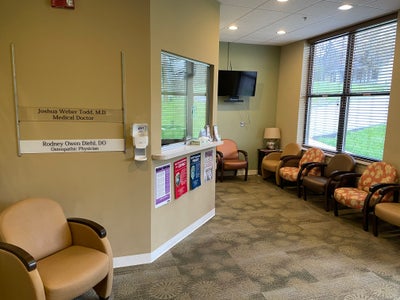Knoxville Heart Group – Downtown Knoxville
- Doctors Office
Patient Tools
Get started with some of our online patient tools.
About Knoxville Heart Group
At Knoxville Heart Group, we specialize in the treatment of conditions that affect your heart. With more than a century of combined medical experience, our expert healthcare team is ready to provide you with excellent care. Our heart care team includes general and interventional cardiologists, electrophysiologists, nurses and physician assistants who have served Knoxville and East Tennessee for more than 35 years.
Our office is conveniently located at Fort Sanders Regional Medical Center. We also have offices in South Knoxville, Jefferson City, Morristown, Oak Ridge, Sevierville and Tazewell. We’re proud to be a member of Covenant Medical Group, the physician practice group of Covenant Health.
“I take care of the total person from a cardiac standpoint. I share with them about lifestyle choices and risk factors that go into consideration.” – Rodney Diehl, DO, Knoxville Heart Group, Morristown
Schedule an Appointment
East Tennessee’s Trusted Choice for Heart and Vascular Care
Your heart is more than a muscle — it’s the lifebeat of your very being. If you experience unusual heart symptoms or a serious cardiac event, you need care you can trust, delivered in a compassionate environment by experienced medical professionals.
As East Tennessee’s leader in cardiac services, Covenant Health Heart Centers provide expert care to more than 107,000 heart patients throughout our region each year. Our network of nine hospitals and 25 cardiology practices offers the latest advances in cardiology, including cardiac imaging, interventional cardiology, cardiovascular surgery, and rehabilitation.
Cardiology Procedures & Treatments
Cardiac Imaging
Cardiac imaging involves using advanced technology to create detailed images of the heart. These imaging tests help our specialists diagnose heart conditions, assess function, and guide treatment plans. Examples include:
- Echocardiogram
- Cardiac computed tomography (CT)
- Nuclear stress test
- Nuclear treadmill test
- Atrial/Venous ultrasound
- Cardiac MRI
Electrophysiology
Electrophysiology focuses on diagnosing and treating heart rhythm disorders (arrhythmias) by studying the heart’s electrical activity. Electrophysiology procedures help pinpoint irregular electrical signals in the heart and restore normal rhythm through interventions. Common examples include:
- Electrocardiogram (EKG/ECG)
- EP Study (Physicians perform this procedure at Fort Sanders Regional Medical Center)
- Catheter Ablation (Physicians perform this procedure at Fort Sanders Regional Medical Center)
- Tilt Table Testing
- Event Monitoring/Recording
Interventional Cardiology
Interventional cardiology involves minimally invasive procedures using catheters to diagnose and treat heart and blood vessel conditions without open-heart surgery. These techniques are often used to restore blood flow, repair structural issues or treat valve disorders.
- Interventional Cardiac Stenting (Physicians perform this procedure at Fort Sanders Regional Medical Center)
- Patent Foramen Ovale Closure (PFO) (Physicians perform this procedure at Fort Sanders Regional Medical Center)
- Percutaneous Coronary Intervention (PCI) (Physicians perform this procedure at Fort Sanders Regional Medical Center)
Structural Cardiology
Structural cardiology focuses on diagnosing and treating defects or abnormalities in the heart’s structure, including valves, chambers, and blood vessels. Treatment often involves minimally invasive procedures, such as valve repair or closure of congenital heart defects, to improve heart function and patient outcomes. Structural cardiology procedures are performed at Parkwest Medical Center and include:
- MitraClip Procedures (Physicians perform this procedure at Parkwest Medical Center starting Aug. 2025)
- Transcatheter Aortic Valve Replacement (TAVR) (Physicians perform this procedure at Parkwest Medical Center starting Aug. 2025)










